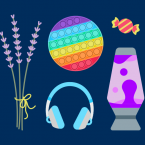
Smart phones have made our lives easier in so many ways, you may feel like you can't live without your device. Odds are, you're reading this article on a phone right now! Technology is a part of everyday – every hour – life! So, knowing that, how do we take care of ourselves and make sure we aren’t overly dependent, or addicted, to our phones?
As with any problematic behavior, the main questions to ask yourself – or your children – are these:
- Is your phone interfering with your ability to sleep, study, work, or socialize?
- Does it seem like a battle to turn off electronics at the end of the day?
- Does the thought of doing that increase anxiety or feelings of discomfort?
Over the last 15 years, research studies in the area of phone and internet addiction have exploded. Most of the recent research supports the idea that phone addiction affects the brain just like other addictions do. When you are getting “likes” on social media, open an app and see you have notifications, or hear that pleasant “ding” from an incoming text, your brain is releasing dopamine – the same hormone and neurotransmitter that signals pleasure when we eat something amazing or have positive social interactions. When it takes such little effort to get a surge of positive feedback, it’s no wonder people have their phone in hand more often than not. That doesn’t sound so bad, right?
What’s not so great is when people use their phones to regulate their moods rather than using skills or face-to-face interactions with supportive people to do the same.
Over time, the gray matter in certain parts of the brain shrinks, specifically, in regions responsible for things like memory, recall, self-control, decision-making, and emotional regulation. Luckily, you can do things (like exercise, sleep, learn new things, and meditate) to combat this and increase the amount of gray matter.
If you think your phone use is problematic, what can you do?
4 Tips to Curb Phone Usage
Disable notifications
Silence ring tones or text tones, and change the settings so you receive fewer banner notifications.
Change display settings
Use "dark mode" so that you aren’t lured by bright, fun colors that keep your attention for longer.
Practice mindfulness
When you grab your phone, ask yourself, "Why am i using my phone? Is this the best use of my time?"
Therapy
Cognitive Behavioral Therapy (CBT) is an evidenced-based therapy that helps address problematic thinking and behavior and has been modified for several types of addictions.
No matter your struggle, The Village is here for you. Contact one of our locations or request an appointment online.

Kat Tidd, MSW, LICSW, is an in-office therapist at The Village's Moorhead office. She earned a Bachelor’s degree in Social Work in 2010 from University of Texas at Arlington and a Master’s degree in Clinical Social Work from Michigan State University in 2014. She has experience working with people across the life span, from young children through the end of life. Special areas of interest include sexual behavior problems, pregnancy loss/infertility, and parenting skills. In addition to working with children and families, she enjoys running, spending time with her family, being outdoors, cooking, and home renovation projects.




